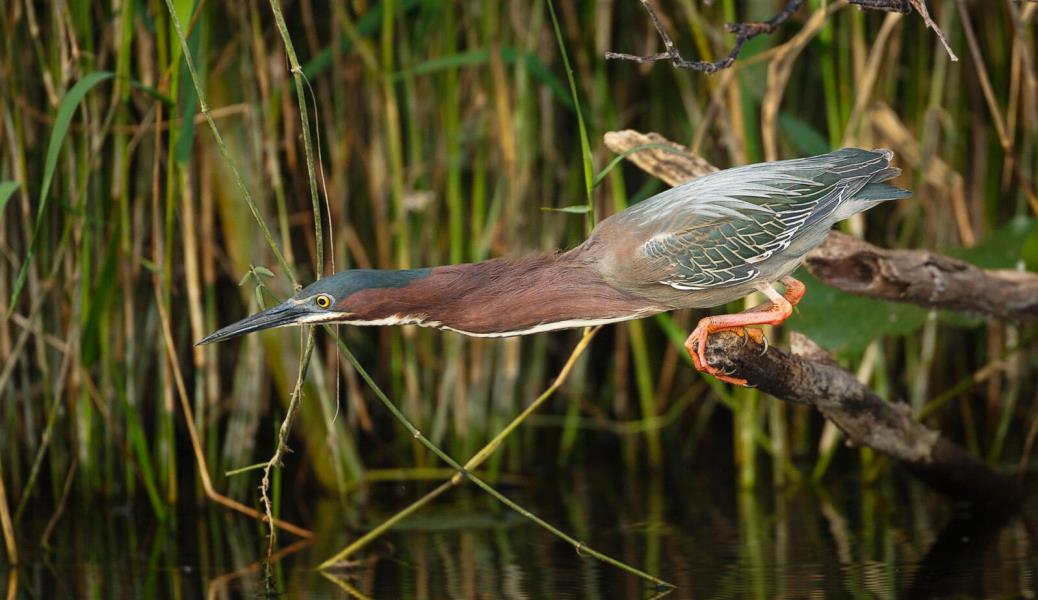On August 27, 2020, as Hurricane Laura was making landfall as the strongest storm to hit Louisiana in more than 150 years, the Senate Special Committee on the Climate Crisis released a report that aims to address climate-related disasters and other impacts.
The Case for Climate Action: Building a Clean Energy Economy for the American People lays out a bold plan for Congressional action to address climate change, which is amplifying the frequency and severity of these types of extreme storms.
The report makes the economic case for how addressing the climate crisis can help reduce risks of damages from natural disasters, create jobs, improve public health, and enhance natural landscapes that provide important benefits to birds and people. (It also raises the hopeful—if somewhat unlikely—possibility that not all U.S. Senators are whores for the fossil fuel industry.)
To make the case, the report includes dire statistics about how climate change is already affecting communities across the country and how climate risks will mount as the planet continues to warm.
The report notes that:
- Hurricanes between 2000 and 2018 caused more than 6,000 deaths and $800 billion in economic losses;
- Record flooding in 2019 caused more than $6.2 billion in damages in the Midwest alone;
- States in the West are seeing year-round fire season that is increasing deadly and destructive wildfires, like the Camp Fire in Paradise, California that destroyed more than 11,000 structures and killed 85 people and like the record-breaking wildfires that have ravaged California this summer; and
- Without action, under a high-emission scenario, the U.S. stands to lose 9% percent of our GDP by 2060. That’s the equivalent of the economic downturn created by the Great Recession, but with climate the losses would be permanent.
The report also draws attention to the unique threats that climate change poses to species and biodiversity, noting that unabated emissions will threaten an additional 16% of species with extinction.
This is supported by the National Audubon Society’s research, which shows that nearly two-thirds of bird species may not survive if we fail to keep warming below 1.5° C.
To help advance solutions to the climate crisis, the report features innovative examples of how cities and states are taking action to address climate risks, like efforts in Philadelphia to deploy nature-based stormwater solutions citywide to manage increasingly heavy rainfall.
Congress can support this work by championing federal policies that help protect, preserve, and restore natural lands as a strategy for enhancing community resilience, reducing air and water pollution, creating high-paying jobs in the restoration economy, and providing important habitats for birds and other wildlife.
Many of the recommendations in the report align with Audubon’s priorities for protecting and restoring our “natural infrastructure,” like our wetlands and coastal landscapes that provide flood buffers for communities, capture and store carbon pollution, and provide important habitats needed to ensure the survival of birds and other species.
Notable recommendations in the report include:
- Reforming the National Flood Insurance Program and encouraging smart-growth practices to ensure that new development reduces carbon pollution, avoids climate-vulnerable areas, and preserves natural floodplains that enhance community resilience;
- Setting up creative ways to finance expensive resilience projects—like state resilient infrastructure banks or new revolving loan funds—to make proactive investments in climate resilience more affordable for communities;
- Protecting and preserving critical blue carbon resources—like coastal wetlands, mangroves, and seagrass beds—that have the capacity to store over 2.8 gigatons of carbon pollution by 2060 if preserved and restored (the equivalent of taking approximately 600 million cars off the road for a year). These coastal assets also provide natural flood buffers for communities and important habitats for birds, fish, and other wildlife; and
- Encouraging natural infrastructure solutions by building on the success of the Green Project Reserve, which sets aside 20% of Clean Water State Revolving Funds for projects like nature-based stormwater management (also called “green infrastructure”), and enhancing the Army Corps of Engineers role in advancing nature-based solutions for reducing flood risk with projects funded through Water Resource Development Acts.
The report also draws attention to the disproportionate risks that climate change poses to low-income communities, and specifically communities of color. These communities often have less access to financial resources, have seen a history of underinvestment, and some—like native and rural communities—depend on their environment to support their economies, putting them at greater risk of disruption from climate-related threats.
The report discusses the role racial and economic inequality will play in magnifying climate risks and includes recommendations on ways that Congress can advance equitable solutions to climate change, including by creating green job opportunities; directing investments in clean energy, durable housing, and transit to underserved communities; and ensuring that marginalized communities are engaged in all stages of policymaking processes and that equity is considered in federal decision-making.
Audubon supports these recommendations in the Senate report, and we look forward to working with members of Congress across the political spectrum to move specific legislative proposals forward that will address the climate crisis, and protect birds and people and the places they need.
Photo of Green Heron is by Edward Cordes via Audubon Photography Awards.

